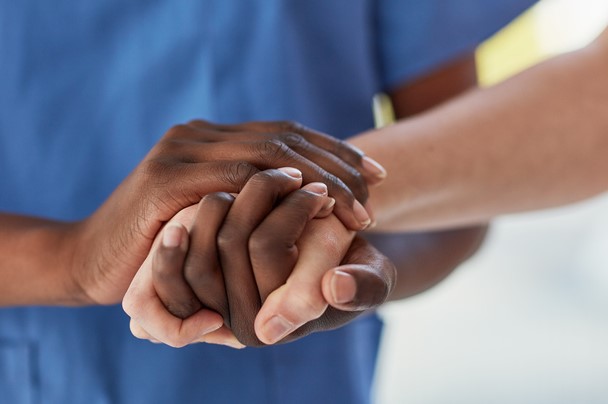
You have cancer. Now what?
There are few things in life more overwhelming than finding out you have cancer. It’s OK not to know what to do.
Cindy Deminsky, an oncology certified nurse navigator with Northside Hospital Cancer Institute, offers these practical steps to help you get your bearings—so you can focus on getting better.
Take a moment to acknowledge your emotions
It may seem as if there’s a lot to do—and there is—but it’s OK to allow yourself time to process your diagnosis and experience emotions like fear, sadness and anger before jumping into scheduling appointments and tests.
And remember that it’s common for people with cancer to experience some form of anxiety or depression after a diagnosis or during treatment, Deminsky says. “If you are feeling anxiety or fear or depression, then you need to reach out to your provider for treatment,” she says.
Get organized
In the weeks and months to come, you’ll attend countless appointments and be inundated with massive amounts of information, from paperwork and test results to brochures and business cards.
“I recommend that you keep a binder of the information you’re given and the notes you’re taking so that everything related to your diagnosis is all in one place and easily accessible,” Deminsky says.
Get a grasp on your diagnosis and treatment plan
Finding out you have cancer is a lot to take in.
“When somebody tells you that you have a cancer diagnosis, that’s probably the only thing you hear, and any information after that is pretty much a blur,” Deminsky says.
That’s why it’s wise to schedule a second appointment with your oncologist to review your diagnosis and treatment plan after you’ve had a chance to process the news. In the days leading up to this appointment, write down any questions you think of to ask your doctor. Bring a support person as an extra set of ears.
Connect with resources
Ask if your hospital or treatment facility offers cancer support groups, workshops or trained support staff, such as oncology social workers and oncology nurse navigators, to help you during your cancer journey. A nurse navigator is a registered nurse who has years of experience in cancer care and has additional knowledge and training in a specific cancer diagnosis.
“If you don’t understand the cancer diagnosis, we can explain and reinforce what your health care provider has told you,” Deminsky says. “We assist with any barriers to care you may have, such as transportation, finances, and understanding your diagnosis and treatment plan. We can connect you to different resources so you don’t have delays in care.”
Meet with a financial counselor
Cancer care can be costly, but money is the last thing you want to worry about when you’re trying to get better. Reduce some of that financial stress by meeting with a financial counselor (or other staff member who works in this role) at your hospital before beginning your treatment.
“Through the hospital, we have a program for financial assistance,” Deminsky says. “We also can connect you with community resources if you need help paying your light bill or you’re having trouble getting food.”
Identify your support system
In the weeks and months to come, it may be difficult to keep up with your current responsibilities. Telling people you can count on—close friends, family members and neighbors—about your diagnosis and empowering them to help can avoid stress later on. This may include light housekeeping, meal preparation or grocery shopping. If you have young children, you might need a babysitter or someone to transport kids to and from school, sports practices or extracurricular activities.
“When you have cancer, your friends and family members want to help, but they may not always know what to say or do,” Deminsky says. “Don’t be afraid to ask them to help with what you need - a meal, a ride to an appointment or just an open ear. Express what you need for them to provide support to you.”
Focus on getting better
You’re now ready to begin your treatment—and that’s when the real work begins. Try to minimize obligations in your life that increase your stress level or drain your energy reserves by accepting the help that others offer. This is also the time to take care of yourself, Deminsky says.
“Make sure you’re getting proper nutrition,” she says. “Also, if you’re able to tolerate it, I highly recommend exercise—things that are low impact, like taking a walk around the block or doing chair exercises. Exercise is a great way to have those endorphins, which is a natural stress reliever. Try to keep as much of a positive mental state as possible.”
“It is important to take care of the ‘whole’ self and the person that you are… the physical, emotional and spiritual parts that make you ‘whole’,” Deminsky adds. “Often, the initial focus on the physical part of the diagnosis and having a treatment plan is so important, but be willing and open to treating the emotional and spiritual side to you as well.”
“It is normal to have feelings of anxiety, fear and worries about the future after receiving a diagnosis of cancer,” Deminsky concludes. “Once you have identified your feelings, it is important to process through them. There are trained professionals and resources in place to help you with this. Do not be afraid to ask for help… we are here for you.”
